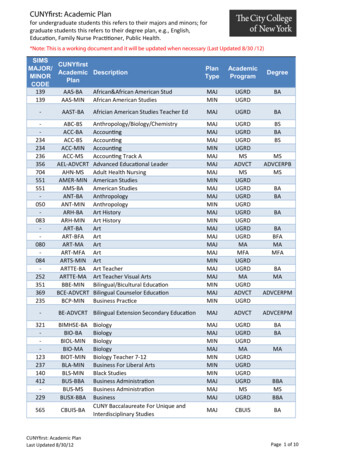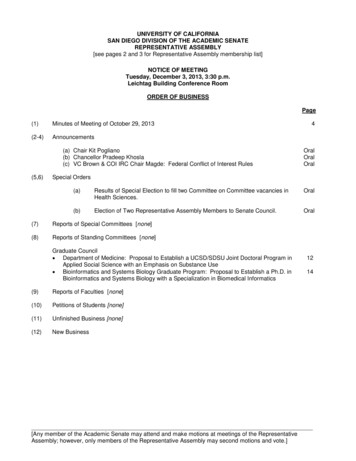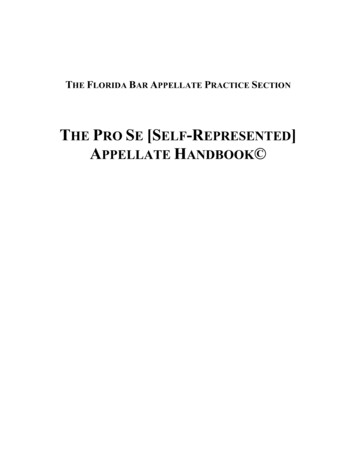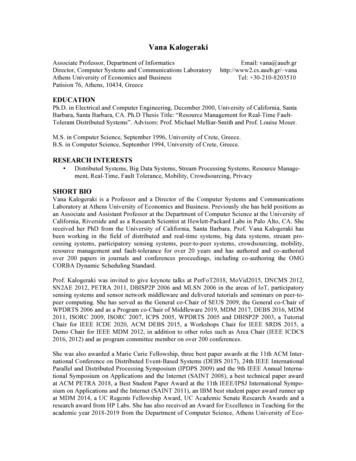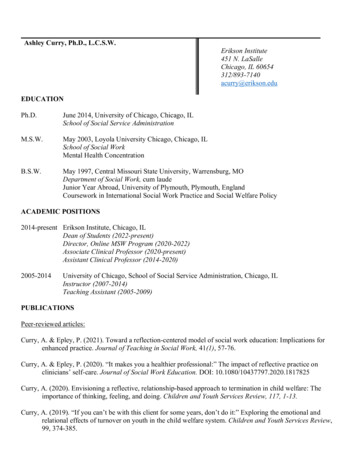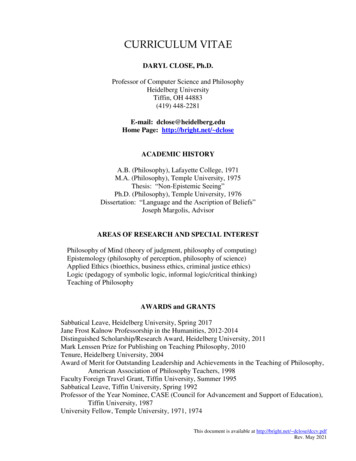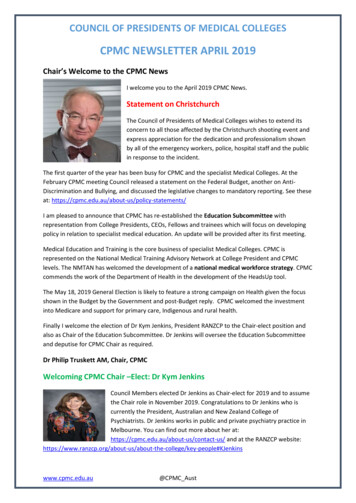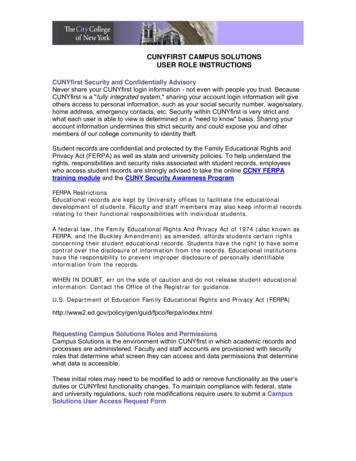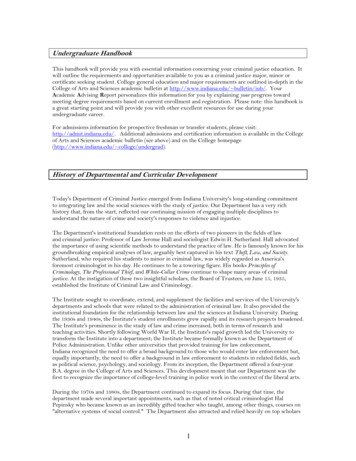
Transcription
Undergraduate HandbookThis handbook will provide you with essential information concerning your criminal justice education. Itwill outline the requirements and opportunities available to you as a criminal justice major, minor orcertificate seeking student. College general education and major requirements are outlined in-depth in theCollege of Arts and Sciences academic bulletin at http://www.indiana.edu/ bulletin/iub/. YourAcademic Advising Report personalizes this information for you by explaining your progress towardmeeting degree requirements based on current enrollment and registration. Please note: this handbook isa great starting point and will provide you with other excellent resources for use during yourundergraduate career.For admissions information for prospective freshman or transfer students, please visit:http://admit.indiana.edu/. Additional admissions and certification information is available in the Collegeof Arts and Sciences academic bulletin (see above) and on the College homepage(http://www.indiana.edu/ college/undergrad).History of Departmental and Curricular DevelopmentToday's Department of Criminal Justice emerged from Indiana University's long-standing commitmentto integrating law and the social sciences with the study of justice. Our Department has a very richhistory that, from the start, reflected our continuing mission of engaging multiple disciplines tounderstand the nature of crime and society's responses to violence and injustice.The Department's institutional foundation rests on the efforts of two pioneers in the fields of lawand criminal justice: Professor of Law Jerome Hall and sociologist Edwin H. Sutherland. Hall advocatedthe importance of using scientific methods to understand the practice of law. He is famously known for hisgroundbreaking empirical analyses of law, arguably best captured in his text Theft, Law, and Society.Sutherland, who required his students to minor in criminal law, was widely regarded as America'sforemost criminologist in his day. He continues to be a towering figure. His books Principles ofCriminology, The Professional Thief, and White-Collar Crime continue to shape many areas of criminaljustice. At the instigation of these two insightful scholars, the Board of Trustees, on June 15, 1935,established the Institute of Criminal Law and Criminology.The Institute sought to coordinate, extend, and supplement the facilities and services of the University'sdepartments and schools that were related to the administration of criminal law. It also provided theinstitutional foundation for the relationship between law and the sciences at Indiana University. Duringthe 1930s and 1940s, the Institute's student enrollments grew rapidly and its research projects broadened.The Institute's prominence in the study of law and crime increased, both in terms of research andteaching activities. Shortly following World War II, the Institute's rapid growth led the University totransform the Institute into a department; the Institute became formally known as the Department ofPolice Administration. Unlike other universities that provided training for law enforcement,Indiana recognized the need to offer a broad background to those who would enter law enforcement but,equally importantly, the need to offer a background in law enforcement to students in related fields, suchas political science, psychology, and sociology. From its inception, the Department offered a four-yearB.A. degree in the College of Arts and Sciences. This development meant that our Department was thefirst to recognize the importance of college-level training in police work in the context of the liberal arts.During the 1970s and 1980s, the Department continued to expand its focus. During that time, thedepartment made several important appointments, such as that of noted critical criminologist HalPepinsky who became known as an incredibly gifted teacher who taught, among other things, courses on"alternative systems of social control." The Department also attracted and relied heavily on top scholars1
who were trained in different disciplines; these scholars included Ellen Dwyer (History), Lee Luskin(Political Science), Philip Parnell (Anthropology) and Cathy Widom (Psychology). These new facultymembers permitted the Department to develop and add innovative courses to complement whatpreviously had been known as core courses in forensic and police science. Their courses continued thetradition of looking at multiple facets of crime and justice, as reflected in such courses as the history ofcrime, social control, psychology of crime, community policing, alternative dispute negotiations, courtadministration, and courses adopting a cross-cultural perspective. The group's commitment tointerdisciplinary research helped attract faculty from a broad range of academic disciplines as well asthose trained in criminal justice itself. In an effort to reflect the faculty's diversity of interests andresearch goals, the Department changed its name twice during this period. For a brief period, theDepartment was known as the Department of Forensic Studies. That focus reflected, for example, thework of Robert Borkenstein, widely known for inventing and popularizing the Breathalyzer. In 1985, theDepartment acquired its present and more encompassing name of Criminal Justice. This new namereflected the Department's effort to broaden its intellectual reach even further than it already had soughtat its inception.Soon after, the Department recruited Coramae Richey Mann to help establish a doctoral program. Mannwas, and remains, a major intellectual figure in the study of race, gender and inequality who vehementlyargued that the criminal justice system was racist. Her strong personality was instrumental in creating anenvironment that attracted to IU several prominent researchers who study the intersections of race andcrime. She helped ensure that the Department would be a leading center of research relating to race,diversity, and inequality.In 1997, the Department's faculty solidified its commitment to research and teaching by formallylaunching its Ph.D. program in what has become known as the field of criminal justice. Given itsinstitutional history, it is not surprising to find the program’s strong commitment to interdisciplinaryapproaches to understanding crime and justice. The Department eventually would hire sociologists,psychologists, lawyers, demographers, criminologists, anthropologists, philosophers, anddevelopmentalists. The department did so while hiring several professors who were trained formally in"criminal justice". These additions ensured that students, both graduate and undergraduate, would benefitfrom the work of faculty who conduct research and teach in the field of criminal justice as well as in otherfields that examine issues relating to crime and justice.The Department of Criminal Justice still fully embraces its liberal arts mission. Faculty seek to bridge thegaps between law and the social sciences through the study of the administration of criminal and civiljustice systems, the nature of crime and deviance, the relationship between law and its social context,and the recognition of the importance of cross-cultural inquiry for the field. Equally importantly, facultymembers are known for moving their inquiry beyond the study of law and formal justice systems andtoward the study of many forms of violence in personal relationships, institutions, and broadersociety. Just as we have become unique in our focus on international and cross-cultural inquiry, we nowhave become unique in our recognition that issues of crime and justice involve profound issues of mentalhealth and mental health systems. We are a diverse group, but each one of us remains committed toreshaping, challenging and furthering our understanding of crime and justice.2
IntroductionCriminal Justice is an interdisciplinary field that draws on the social sciences, legal studies, and thehumanities. Teaching and research are carried out by a diverse group of scholars trained in CriminalJustice and Criminology, Law, History, Political Science, Anthropology, Sociology, Geography, andPsychology. The Department also offers a variety of courses taught by adjunct faculty who are careerprofessionals in the criminal justice system.The Department of Criminal Justice provides students with a liberal arts education to assist them inunderstanding problems of crime, law, and social control systems. The Department focuses on socialnorms, rules, and laws; the causes of their violations; and the social and legal response to these violations.Systems of regulation, including the criminal justice system and dispute resolution processes, are studiedand evaluated as organizational, social and cultural processes.The undergraduate program allows students pursuing a major, minor or certificate to establish a solidfoundation in the discipline of criminal justice through exposure to theories of crime and deviance, broadperspectives on the criminal justice system, and alternative social control systems. The undergraduateprogram also provides an excellent opportunity for students to pursue personal interests in criminaljustice through a wide variety of elective courses. The degree is designed for students interested instudying justice-related issues, including law. A background in criminal justice provides an excellentfoundation for careers and graduate work in law, social work, journalism, government, research, orcommunity service as well as many other areas that seek experience in liberal arts.MissionOur mission is to conduct and disseminate first-rate research on crime and justice, to provide outstandingteaching, and to serve our campus, community, and profession with the utmost distinction. We strive tobe a vibrant interdisciplinary department that promotes synergy among research, teaching, and service tostudents and our respective fields of study. We firmly believe that such synergy produces dynamism inthe educational environment we offer and drives the identification of issues that form the basis of ourexcellence in scholarly productivity. The following goals shape our efforts: Foster a collegial environment that celebrates our passion for learningRecruit, retain, and develop a diverse and exceptionally talented student bodyProvide high quality courses and other means of instruction that meet students’ needsEnable and promote new knowledge through disciplinary and interdisciplinary researchReach the highest standards of scholarship reflective of our University’s world-class statusEmbrace the opportunity to contribute each of our strengths to the evolving character of thediscipline of criminal justiceNurture the commitment to making a difference in the world and to serving societyDeepen our sensitivity to visible and invisible injusticesRecognize our responsibilities to one another and facilitate our professional developmentOur goals contribute to our vision of capitalizing on our faculty and students’ wide range of disciplinarytraining, teaching experiences, scholarship, and personal strengths to build and maintain a first-rate,interdisciplinary educational program marked by a firm commitment to the liberal arts.3
4
Department of Criminal Justice, Tenure-Stream FacultyMark Berg (Assistant Professor)Social context of adolescent development; youthaggression and victimization; mobilization oflaw; life-course explanations.Sycamore 311; 856-2711Email: markberg@indiana.eduNathalie Fontaine (Assistant Professor)Developmental criminology andpsychopathology; prevention and interventionof antisocial behavior and related adjustmentproblems; gender and antisocial behavior;callous-unemotional traits; longitudinal andexperimental designs.Sycamore 319; 855-9325Email: nfontain@indiana.eduMichael Grossberg: (Sally M. ReahardProfessor of History & Professor of Law;Interim Department Chair)American legal history; History of children andthe family; History of American social policy.Sycamore 337; 855-3882Email: grossber@indiana.eduStephanie Kane: (Associate Professor) AIDSand Criminal Justice, social organization ofprostitution, drug use, sorcery, indigenousrights, popular culture, ethnography, narrativeanalysis, urban U.S., Caribbean, CentralAmerica.Sycamore 305; 855-0896Email: stkane@indiana.eduRoger Levesque: (Professor) International law,child sexual abuse, psychology and the law,family issues, law and society.Sycamore 308; 856-1210Email: rlevesqu@indiana.eduWilliam Oliver: (Associate Professor) Violence,prisons, alcohol and crime, minorities.Sycamore 321; 855-6772Email: wioliver@indiana.eduPhilip Parnell: (Associate Professor)Community justice, dispute management,comparative law and society.Sycamore 306; 855-1198Email: parnell@indiana.eduWilliam Alex Pridemore: (Professor andDirector of Graduate Affairs)Social Structure and homicide, Russia,measurement of crime, theoretical criminology.Sycamore 313; 856-2220Email: wpridemo@indiana.eduBruce Sales (Virginia A. Roberts Professor)Psychology of law and legal processes,psychology of law in society, psychology ofcriminal behavior and criminal justice.Sycamore 341; 856-1324Email: bdsales@indiana.eduMarla Sandys: (Associate Professor andDirector of Undergraduate Studies) Capitalpunishment, juries, attitudes, and researchmethods.Sycamore 327; 855-5892Email: msandys@indiana.eduKip Schlegel: (Professor and director of thedepartmental AI Training Program)White-collar crime, organized crime,sentencing, planning and evaluation.Sycamore 324; 855-0889Email: schlegel@indiana.eduRichard Spano: (Assistant Professor)Policing, life-course explanations of criminaloffending and violence, criminological theory,research methods.Sycamore 315; 856-1441Email: rspano@indiana.eduArvind Verma: (Associate Professor)Quantitative analysis, policing, environmentalcriminology, geography and crime.Sycamore 307; 855-0220Email: averma@indiana.edu5
Department of Criminal Justice, Non-Tenure-Stream and Emeritus FacultyRobert Bingham: Robert Bingham is Chief Probation Officer for Marion Superior Court since 2000. He has 38 years ofprobation experience in Pennsylvania, Illinois, Michigan, and Indiana, and has been Chief Probation Officer since 1979specializing in outside intervention and reform.Charles Cohen: Charles Cohen is a Lieutenant serving the Indiana State Police, where he has been employed since 1994.He is currently the Commander of the Special Investigations and Criminal Intelligence Sections. In this capacity, Lt.Cohen is responsible for the cyber crime, white collar crime, vehicle crime, and crimes against children units along withoverseeing the department’s overt and covert criminal intelligence function.Rodney Deaton: Rod Deaton has been in the full-time, private practice of psychotherapy since 1998. He formerlyworked as a psychiatrist in the public sector and as a psychiatric consultant to courts and attorneys throughout IndianaSteven DeBrota: Steve DeBrota has worked as an Assistant U.S. Attorney in Indianapolis since 1991. He is the ProjectSafe Childhood Coordinator, the Chairperson of the Indiana Environmental Crimes Task Force, and the ComputerHacking and Intellectual Property Coordinator. He is an expert in computer crimes, computer forensic evidence, complexwhite collar crimes, environmental crimes, crimes against children, and internet-related crimes.Mary Ellen Diekhoff: Mary Ellen Diekhoff was a deputy prosecutor for sixteen years in Monroe County, Indiana. Sheis currently a Circuit Court judge in Monroe County, presiding over Circuit V, handling criminal cases.Ellen Dwyer: (Professor Emeritus) Social history of law; medicine and criminal justice; race and psychiatry duringWWII.William Head: (Senior Lecturer) Area of interests: administration of justice, crime and popular culture, private security,crime and public policy.Helen Levesque: Children's rights, gender and social class. "One of the things I most enjoy about teaching statistics is that itgives me the opportunity to provide a good experience with math to students who are afraid of math or who have had bad experienceswith math classes."Richard Lippke: (Senior Scholar) Areas of interest: philosophy of punishment, philosophy of criminal procedure,normative theories of sentencingMary Lee Luskin: (Professor Emeritus) Courts; mentally ill persons in the criminal justice system.Harold Pepinsky: (Professor Emeritus) Areas of interest: crime control and policing, theory, comparative law andsociety.Leon Pettiway: (Professor Emeritus) Urban geography, crime trends, minorities, drug use.Steve Russell: (Professor Emeritus) Areas of interest: American Indian justice policy, judicial selection and tenure,criminal law and procedure, privacy, law and literature, constitutional law, transnational crime, legal status of sexualminorities.6
Department of Criminal Justice Academic AdvisorsValerie C. Aquila, M.A., is the Undergraduate Academic Advisor who works with current, returning,and prospective students interested in the Criminal Justice Program and who are seeking a major, certificate, minor, oranother degree. Valerie is the advisor for the Criminal Justice Student Association (CJSA) and IU’s Beta Kappa chapterof Alpha Phi Sigma, which is the National Criminal Justice Honor Society. She is also the Assistant Coach of the IU EthicsBowl team. Valerie has a background in Mass Communications and Museum Studies. Her office is located in SycamoreHall 336. Her e-mail address is vaquila@indiana.edu.Krystie Herndon, M.L.S., 2009 College of Arts and Sciences Advisor of the Year, is the part-timeundergraduate academic advisor who works primarily with current IU Bloomington students interested in the CriminalJustice program, and current Criminal Justice majors, certificate-seeking students, and minors. Krystie has a backgroundin Library Science, English, and Spanish, and has 20 years of experience here at IU Bloomington. Her office is located inSycamore Hall 301. Her email address is kherndon@indiana.edu.The undergraduate advisors can advise current Criminal Justice students here at IU Bloomington, on degreerequirements, or the CJUS certificate or minor requirements, internship opportunities, and other volunteer, academic, andwellness opportunities within the department, on campus and in town, as well as graduate school and career planning.They may also have information about research and employment opportunities that are available in Indiana and acrossthe country.Online resourcesCriminal Justice undergraduate program academic advising:http://www.iub.edu/ crimjust/undergraduate advise.php?nav undergraduateCriminal Justice undergraduate program academic resources:http://www.iub.edu/ crimjust/undergraduate resource.php?nav undergraduateUndergraduate academic advising syllabus: http://www.iub.edu/ crimjust/advising syllabus.pdfFind all of the undergraduate resources and information you need here: www.iubcjus.blogspot.comWe are now on Facebook! You can become a fan of “IU Criminal on-IN/IU-Criminal-Justice/1031007386927
What requires an advising appointment?If you are a student in the College of Arts and Sciences, please schedule an appointment to do the following: If you want to officially declare your CJUS 2nd degreeIf you have questions about your degree or CJUS major requirements and your progress, that require a review ofyour Academic Advisement Report by an advisor in order to answer the questionsIf you are interested in any of the following: Departmental Honors (P399 and P499), the National CriminalJustice Honor Society (Alpha Phi Sigma), Internship requirements (P481), Individual Readings and Projects(P495)Please note: you do not need to meet with an advisor to declare your CJUS minor unless we advise you to do so or if youchoose to do so. Please email a CJUS advisor with your name and student ID# to have your minor declared. A follow up emailwill be sent to you confirming the courses that count towards your minor and any that you may still need totake.If you are a student not in the College of Arts and Sciences, please schedule an appointment to do the following: If you want to officially declare your CJUS major or certificate. Please note: we may ask you to schedule anappointment to declare your minor. To declare a certificate in CJUS, you will need to wait until you have completed the last class for thecertificate requirements to have this declared. Please contact a CJUS advisor once you have completedyour certificate requirements, so this can be processed.To all students, please schedule an advising appointment, if you have questions about your progress towards your CJUSmajor, minor or certificate, and or COLL BA degree requirements (if applicable) and progress, that will require a reviewof your Academic Advisement Report (AAR) by an advisor in order to answer the questions, please schedule an advisingappointment or come to walk-in hours.Please check the CJUS undergraduate blog page for resources and information!www.iubcjus.blogspot.comTo schedule an appointment with a Criminal Justice Advisor, please call the main office at 812-855-9325. This mainoffice is open from 8:00am to 5:00pm, Monday-Friday. Please note: there is no answering machine. Advising hours are9-12 pm and 1-4 pm, Monday-Friday (subject to variation and dependent upon previously scheduled appointments).8
CriminalJustice9
Bachelor of Arts Degree Requirements with a major in Criminal Justice*Start date May 2011 *To certify into the College of Arts and Sciences: 26 hours earned, English Composition completed, and at least a 2.000GPA is needed. College & major GPA needs to be at least a 2.000Credit hours needed: 122 total hours with at least 36 of them at the 300/400 level [26 credit hours must betaken on the Bloomington campus during your senior status (from the time you reach 86 hours (registered andearned) to 122 hours); and Only 22 can be taken outside the College of Arts and Sciences (this includes credit fromall other schools on this campus, military credit, ROTC credit & major hours past 42 credits)]General Education Common Ground Curriculum (GenEd) http://www.iu.edu/ bulletin/iub/generaleducation/2011-2012/ English Composition requirement (C- or higher needed in one of these courses--) andMathematical Modeling requirement: (D- or higher in finite or higher); Breadth of Inquiry: Two Arts andHumanities courses (A&H) (GE 100-200 level), Two Social and historical courses (S&H) (GE 100-200 level) (CJUSP100, P200, P202), One to Two Natural and Mathematical courses (Math Modeling does not count here) (1 naturalscience course needed) (GE 100-200 level); and World Cultures and Languages: Proficiency at the fourth semester levelin one language for COLL degree requirement will take care of this. 6 hours must be taken on the IUB Campus.College of Arts and Sciences Education (CASE)CASE English Composition and Mathematical Modeling covered by GenEd. CASE breadth of Inquiry (passinggrade required; if counting towards major, minor, certificate, check with specific department)—Critical Approaches toArts and Sciences (previously Topics) course (C103 A&H; C104 S&H; C105 N&M) (CAPP courses in Appendix IIIin the bulletin: aches/; Four Arts and Humanities (2 GE) (A&H);Four Social and Historical (2GE) (S&H—CJUS major); and three to four Natural and Mathematical Sciences (1-2GE) (N&M) (CJUS-K300 & Finite count here) (CASE Breadth of Inquiry courses--A&H, S&H, and N&M—are inAppendix II in the bulletin: http://www.iu.edu/ /appendix2.shtml; CASE Intensive Writing course (grade requirement determined by instructor) these can vary from semester tosemester. Please check the IW list for the specific semester when looking for an option for registration purposes. Thelist is linked on the CJUS blog: www.iubcjus.blogspot.com (View by semester date under “Academic Links” on the righthand-side of the blog website); Foreign Language requirement (GenEd WCC) (Proficiency at the 4th semester level inone language; grade requirement determined by language department); and Two Culture Studies courses (one fromDiversity in the US and one from Global Civilizations and Cultures) (DUS/GCC) (Culture Studies courses in Appendix Iin the bulletin: http://www.iu.edu/ /appendix-1.shtml.CJUS Major Requirements (CJUS) 27 hours; C- or higher needed. Please check with a CJUS advisor for approvedsubstitutions prior to taking a course. CJUS-P100 Introduction to Criminal Justice; CJUS-P200 Theories of Crime andDeviance; CJUS-P202 Law and Social Science; CJUS-P290 The Nature of Inquiry; CJUS-K300 Techniques of DataAnalysis; Two CJUS courses at the 300 or 400 level (One course may be taken from the approved optional course list inthe most recent bulletin and count as a CJUS elective course. Please note: only 1 approved non-CJUS course can countin the major and double majors in disciplines that require stats cannot use this approved optional course option. Pleasenote: any SOC double majors that take both SOC-S370 & SOC-S371 in place of our methods & stats, will need to take athird CJUS course at the 300 or 400 levels. Please note: CJUSP-300 and CJUS-P493 are each repeatable with varyingtopics/seminars up to three times, for a total of 9 credit hours earned.); and Two CJUS courses specifically at the 400level.Please note: You can major in up to three disciplines and minor in up to three disciplines (along with any certificate(s)you may be working on) to meet the BA degree requirements. If you are pursuing two degrees, like a BA and the BS inthe College, you can actually pursue 4 total majors and 6 minors, and any certificate(s) you may be working on!Diversifying yourself and maximizing your academic experience is important and possible.10
Criminal Justice Major, Minor and Certificate RequirementsCriminal Justice Major RequirementsStudents must complete at least 27 credit hours in criminal justice, including specifically thefollowing courses and general areas: P 100, P 200, P 202, P 290, and CJUS-K 300 (15 credits)o Majors may substitute a course in statistical methods from another department of theCollege of Arts and Sciences, but in that case no course from the list of ApprovedOptional Courses may count toward the major. Students who are interested in pursuingthis option (i.e., an alternative statistics course) must first verify their eligibility withthe Department of Criminal Justice (see undergraduate advisor).Two 3-credit hour Criminal Justice courses specifically at the 400 level (6 credits)Two 3-credit hour Criminal Justice electives at the 300-400 level (6 credits)o 1 course from the Approved Optional Courses list in the bulletin can be substituted forone of the CJUS electives. Please note: only 1 approved course from outside the CJUSmajor can count in the major**A course from this list must be at the 300-400 level, regardless of what yourCollege bulletin may have listed (i.e.: no 200 level courses)*Please note the following course stipulations: As of Fall 2010, P481, P495, P399, and P499 do count in the major Not all statistics courses are approved for our major. Please check with an advising beforetaking another statistic s course you think might count.Students must complete the degree requirements of the College of Arts and Sciences, including therequirement for a minimum of 25 College of Arts and Sciences credit hours in the major subject area.Criminal Justice Minor RequirementsStudents must complete at least 15 credit hours in Criminal Justice courses, including specificallythe following courses and general area: CJUS-P 100, P 200 and P 202Two 3-credit hour criminal justice courses at the 300-400 level on the Bloomington campusPlease note the following courses will not count towards minor requirements: CJUS-K 300 (or any other statistics course) will not count towards the minor requirements The Approved optional course option, open to majors, does not apply to the CJUS minorRequirements and qualification for a Certificate in Criminal JusticeThe Certificate in Criminal Justice may be awarded by the College of Arts & Sciences to students who areworking on degrees other than the B.A. Students enrolled in schools other than the College who have aninterest in Criminal Justice are encouraged to consider the Certificate program. Non-IU students canpursue this option as well. The requirements for a Certificate in Criminal Justice are the same asthe minimum requirements as the major.11
Course InformationCourse Descriptions CJUS–P 100 Introduction to Criminal Justice (3 cr.) CASE S&H P: Freshman or sophomorestanding. Historical and philosophical background, structure, functions, and operation of thecriminal justice system in the United States. Introduction to and principles of formal behaviorcontrol devices. I Sem., II Sem. CJUS–P 150 Introductory Topics in Criminal Justice (3 cr.) CASE S&H Introduction to aspecific topic related to crime and justice. Topics vary each semester: see listing in the onlineSchedule of Classes. Credit will not count toward requirements of the major or minor. May berepeated with different topics for a maximum of 6 credit hours. CJUS–P 200 Theories of Crime and Deviance (3 cr.) CASE S&H Critical examination ofbiological, psychological, and sociological theories of crime and deviance. Examination ofindividual, group, and societal reactions to norm-violating behaviors. I Sem., II Sem. CJUS–P 202 Law and Social Science (3 cr.) CASE S&H Structure and operation of law, legalsystems, and legal processes across both civil and criminal justice; the potential role of socialscience in aiding in understanding that law's creation and implementation, and the potential needfor change. I Sem., II Sem. CJUS–P 210 Service Learning Experience in Criminal Justic
justice systems, the nature of crime and deviance, the relationship between law and its social context, . discipline of criminal justice Nurture the commitment to making a difference in the world and to serving society . psychology of criminal behavior and criminal justice. Sycamore 341; 856-1324 Email: bdsales@indiana.edu
